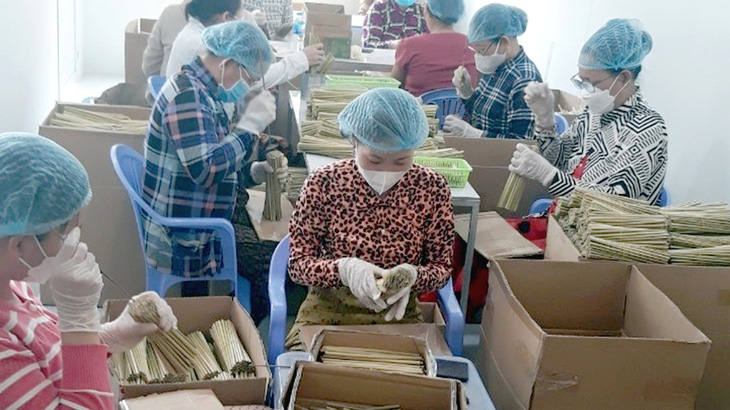Stems of lepironia articulate, a kind of wild grass in salt-marsh areas in Vietnam, are being used to produce straws, which are popularly used in luxury restaurants and preferred by many foreign customers.
Lepironia articulate can be found in southern provinces of Dong Thap, Long An, and Kien Giang.
Local residents use the plant to make handicrafts.
However, Phan Tan Phat, director of ECO PTP Trading and Producing Co. Ltd., has turned it into eco-friendly straws as replacement of single-use plastic straws.
Startup with wild grass
Mature Lepironia articulata trees are often one meter high each and their stems are hollow, which is suitable for producing straws.
Phat, born in Binh Thanh Trung Commune, Lap Vo District, Dong Thap Province, holds a university degree in accounting and had earlier worked in both Dong Thap and other provinces.
During a business trip to the north of Vietnam, he saw bamboo straws were used in a restaurant and he loved them.
He found that customers increasingly prefer eco-friendly products.
He started thinking of his startup. Although he did not know what to do at the time, he wanted to take advantage of local materials to develop his startup’s product.
At that time, Dong Thap Province had straws made of rice flour with various types and designs.
Phat recalled that fresh lepironia articulata straws were quite popular in Ho Chi Minh City but rare in Dong Thap.
Therefore, he collected lepironia articulata in Dong Thap. Due to insufficient supplies, he came to Long An and Kien Giang Provinces to buy more, turning his start-up idea into reality.
“The product is made manually. We use cutting machines and dryers to complete the straws,” Phat said.
When making the decision on quitting a stable job to begin his start-up in his homeland, Phat himself was worried as the business idea was not clear.
He had to carefully calculate the costs for machinery, materials, packaging, and applications for licenses.
Grass straws require a large volume of materials. Some 250 – 300 lepironia articulata trees are needed to produce roughly 300 qualified straws with a sales price of VND350-400, or more than 1 U.S. cents, each.
Lepironia articulata stems are washed many times, cut into pieces, classified, dried, polished and packaged.
Except for the drying and cutting steps, other steps are manually performed by about ten people.
Phat frankly said that he ventured into the business. The required capital was at least VND200 million ($8,462) but he was penniless and had to borrow money from his relatives.
After surveying the market and customers’ demand, he introduced his product on social media first with an aim to popularize the product.
“Thanks to my relationships, I have offered my product to high-end restaurants and hotels.
“As a result, grass straws have been well-known by foreign travelers. Many American customers have visited my company and bought the product”, Phat said.
High export potential
His company produces 50,000-100,000 straws per month to fulfill orders. In 2022, his company provided about two million grass straws to the market, with half of them being exported to the U.S. and Europe.
Tran Thi Cam, deputy head of the Economy-Infrastructure Division of Lap Vo District, said that the product is quite new but it meets the demands of some customer groups and holds high potential for export.
“This is a product of a local startup, so the locality has paid great attention to it and is willing to support it.
“As the main material for the product in the province is not enough and must be bought from other provinces, it is not considered a product of the One Commune, One Product (OCOP) program.
"Nevertheless, this is good news for local economic development,” Cam said.
Like us on Facebook or follow us on Twitter to get the latest news about Vietnam!

















































